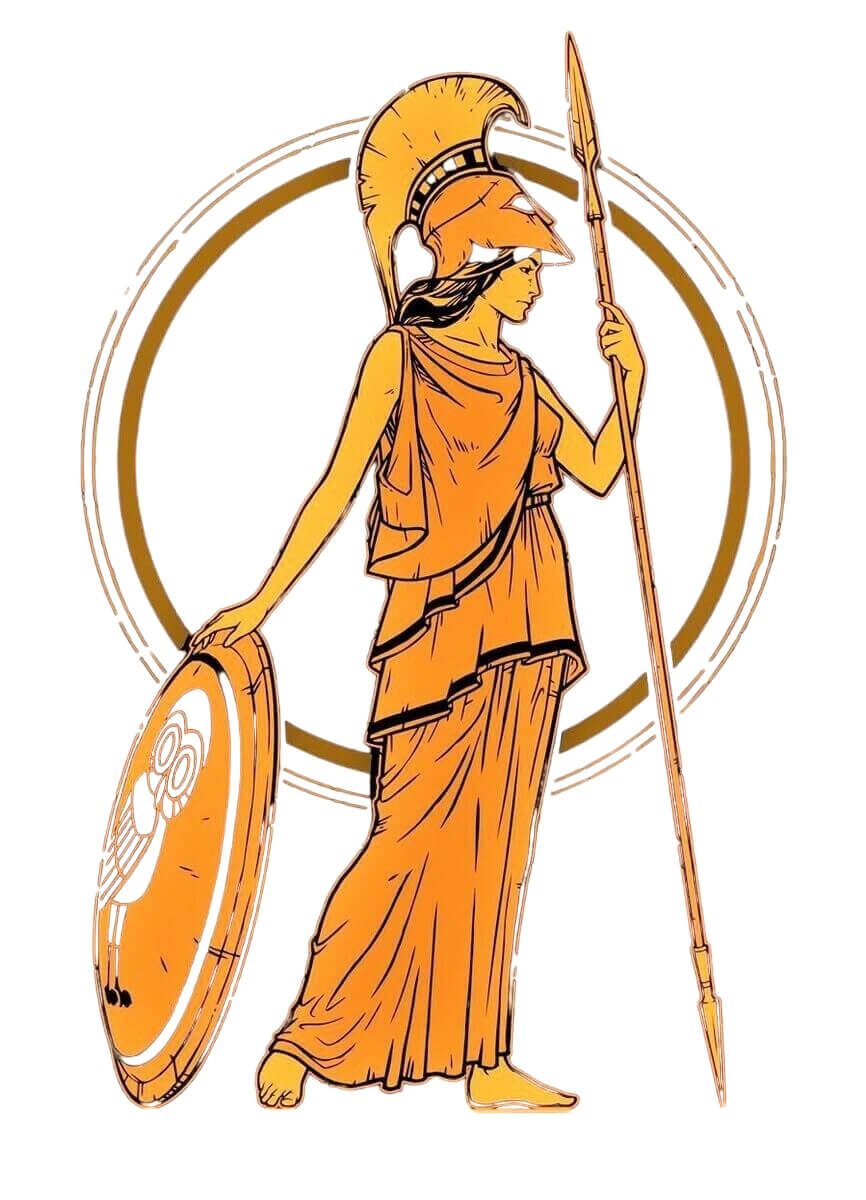Heracles: The strongest Greek Hero
In Greek mythology Heracles was the strongest legendary hero, son of Zeus and the mortal Alcmene. He was condemned and pursued by Hera, in the most vindictive and horrible way. He killed his own wife and kids, as a result of madness, sent upon him by the queen of Olympus. Afterwards, he needed to accomplish twelve impossible feats to redeem himself. Meanwhile Hera kept trying to murder the hero and ridicule his courageous personality. In fact, Heracles had to obey the orders of the weak and pathetic king Eurystheus, succumbing to Hera’s plan because of his feeling of guilt.
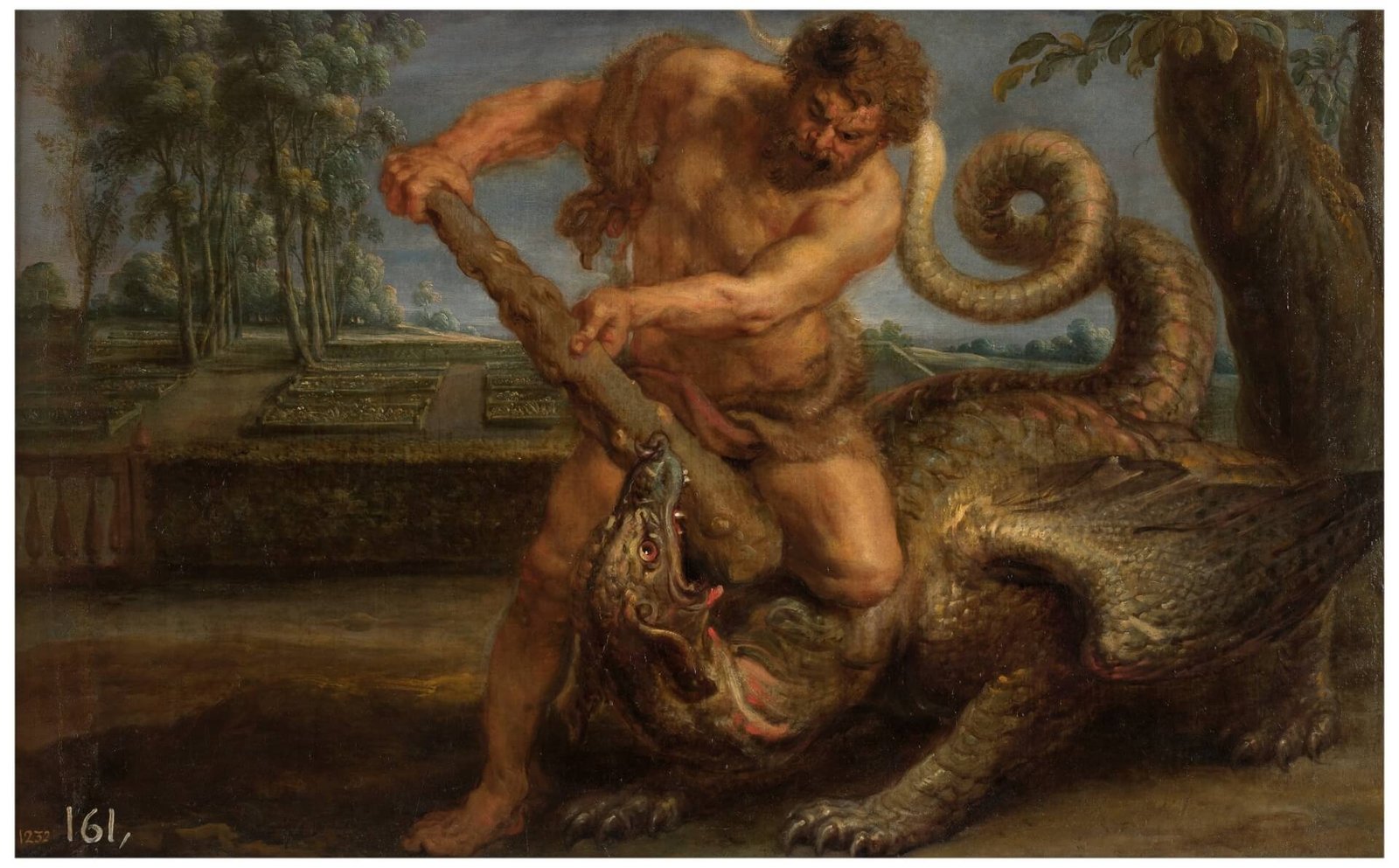
The birth of Heracles
The wife of the Greek hero Amphitryon named Alcmene was very acclaimed because of her beauty throughout Hellas. Zeus himself paid attention to her, and disguised as her husband in order to trick her into a love affair. Alkmena suspected nothing, and soon gave birth to two little twins. One of them was the son of Zeus, the other one – son of Amphitryon.
Shortly before the birth of the twins, Zeus gathered the gods on Olympus and had apprised them of the soon birth of the greatest hero, who would surpass all the mortals by dint of his heroic glory.
The jealous Hera heard these words and realized that Zeus’s son was about to be born. Then again he had cheated on her with a mortal woman! She decided to outwit Zeus and demanded from him an oath to make High King the child, belonging to the House of Perseus, that would be born first that night.
Zeus did not suspect anything and confirmed his words with an oath, thinking that Heracles would be born first. However, Hera hurried to Thebes, and delayed by means of magic the birth of Alcmene’s children. At the same time in Mycenae she hastened the birth of the frail and sickly Eurystheus. Since he was the son of King Sthenelus, and belonged to the house of Perseus as well. This way Eurystheus became the High King and obtained the right to rule over Heracles.
Athena tries to make Heracles immortal
By the time Alcmene felt scared of Hera’s rage Athena had come to make Heracles immortal. She took the little hero till the clouds of Olympus and wanted to make him drink from Hera’s breast. Thereupon Hera didn’t know who was the boy and nursed him because of pity. However, Heracles suckled her breast too strongly and Hera pushed him away. Her milk splashed across the sky, forming the white road of stars – the Milky Way. Afterwards Athena brought Heracles back to his parents. He did not become immortal as she expected, but acquired supernatural powers.
Little Heracles and the snakes
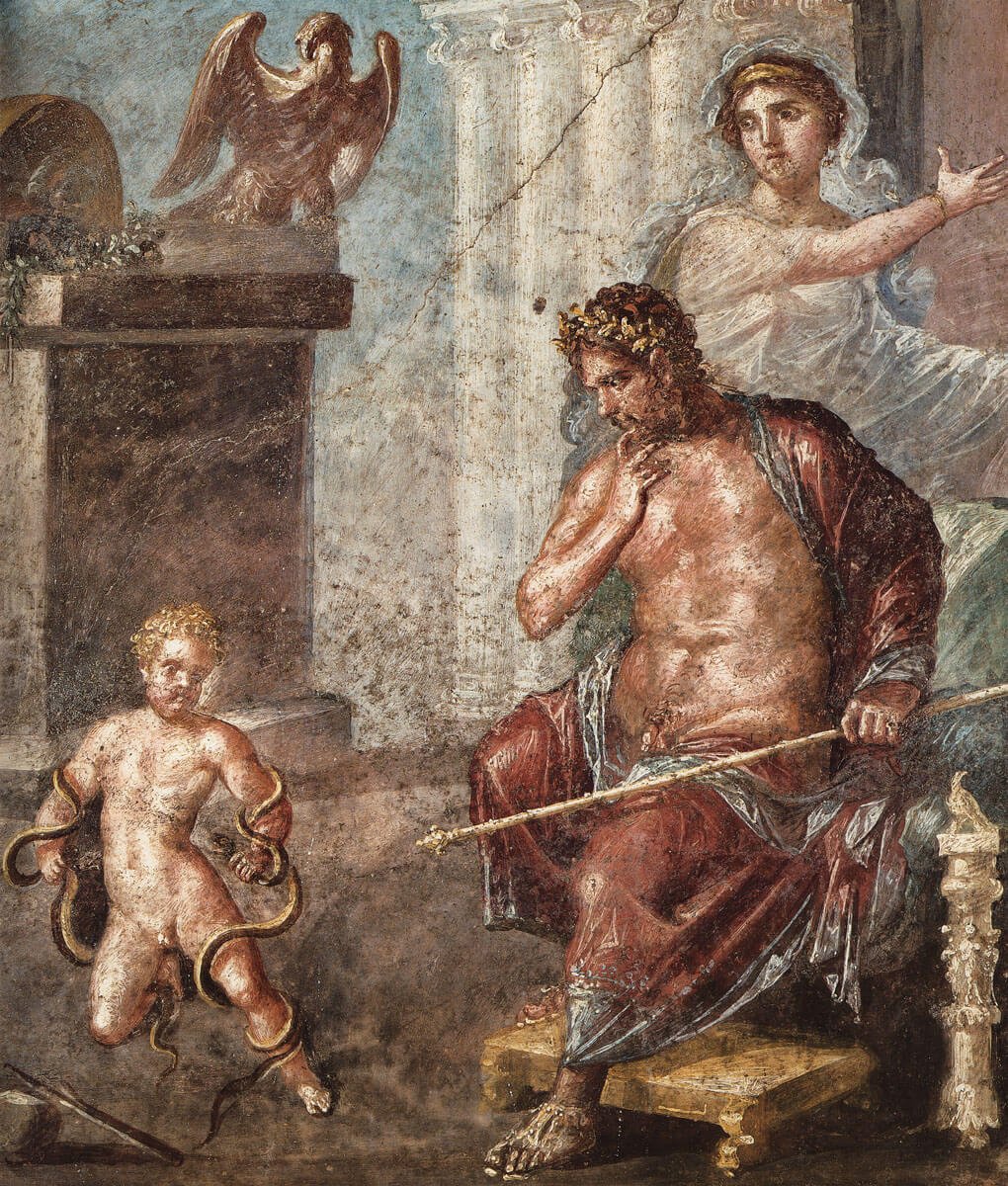
When Heracles was nine months old, Hera sent two huge snakes to the house of Amphitryon to kill him. The snakes crawled along the marble floor into the nursery. Flames burst from their eyes, deadly poison dripped from their teeth. Heracles and Iphicles slept peacefully in the bronze shield of Amphitryon, which served as their cradle and didn’t hear anything. Nonetheless Zeus woke up Heracle’s brother, when the snakes approached. Iphicles cried loudly, and Heracles, grabbed the snakes and strangled them to death. Amphitryon ran into his children’s bedchamber with his sharp sword but saw that the danger was already over. Heracles felt proud of himself and threw the strangled snakes at his feet.
The education of Heracles
When Heracles was a little older, Amphitryon began to teach him everything that a true hero should know and be able to do. The best mentors taught him how to wield weapons, how to win in a fist fight and how to shoot a bow. Amphitryon himself had instructed the young man about the use of a chariot. Heracles had learnt to sing and play musical instruments. To recognize the stars and to reason wisely about divine and human affairs. He became handsome physically and noble in soul. No one could compare himself to the son of Zeus. Heracles never used his exorbitant strength for evil and did not attack first if he was not insulted. He always wished to aid those who required his help.
Gifts of the gods to Heracles
People loved Heracles, but the Olympians considered him to be worth of their respect. They gave him everything he needed. The hero received a sword from Hermes and from Apollo – a bow and arrows with eagle feathers. Hephaestus gave Heracles a shell, and Athena wove beautiful clothes for his athletic body. Even Zeus and Poseidon honored him with their gifts. Poseidon gave him a harness of swift-footed horses, and Zeus rewarded the hero with a magnificent indestructible shield. Heracles accepted these gifts with gratitude, but he rarely used them. He preferred a simple club, bow and arrows to any other weapons.
Hera sends Heracles into madness
Hera hated Heracles very much. For fear of Zeus’ anger, she did not dare to kill the young man, but always tried to ruin his life. The hero had already married and lived very happy, loving his wife and children. Therefore, Hera decided to surpass her usual vindictiveness and stroke him with madness. Heracles became enraged and absolutely crazy, thinking to be surrounded by enemies. As a result, he killed his wife and children afterwards. When the veil of madness fell from his eyes, he realized what he had done. He felt a great sorrow and wanted to redeem his sins, going to the oracle in Delphi for an advice. There he had received the instruction to serve Eurystheus for the next twelve years of his life.
Heracles and Eurystheus
Heracles heard about Eurystheus, (the child, that was born first because of Hera). He knew that he was a weak king and a coward, but he couldn’t do anything to avoid the humiliation. He had to obey the will of the immortal gods. Thus, he went to Mycenae and presented himself before the king. Hera rejoiced at such a folly: now she would be able to find a feat that would certainly kill the hero! Since that moment on, she searched for different impossible tasks and Eurystheus had always sent Heracles to fulfill them.
The Twelve labours of Heracles
Nemean lion
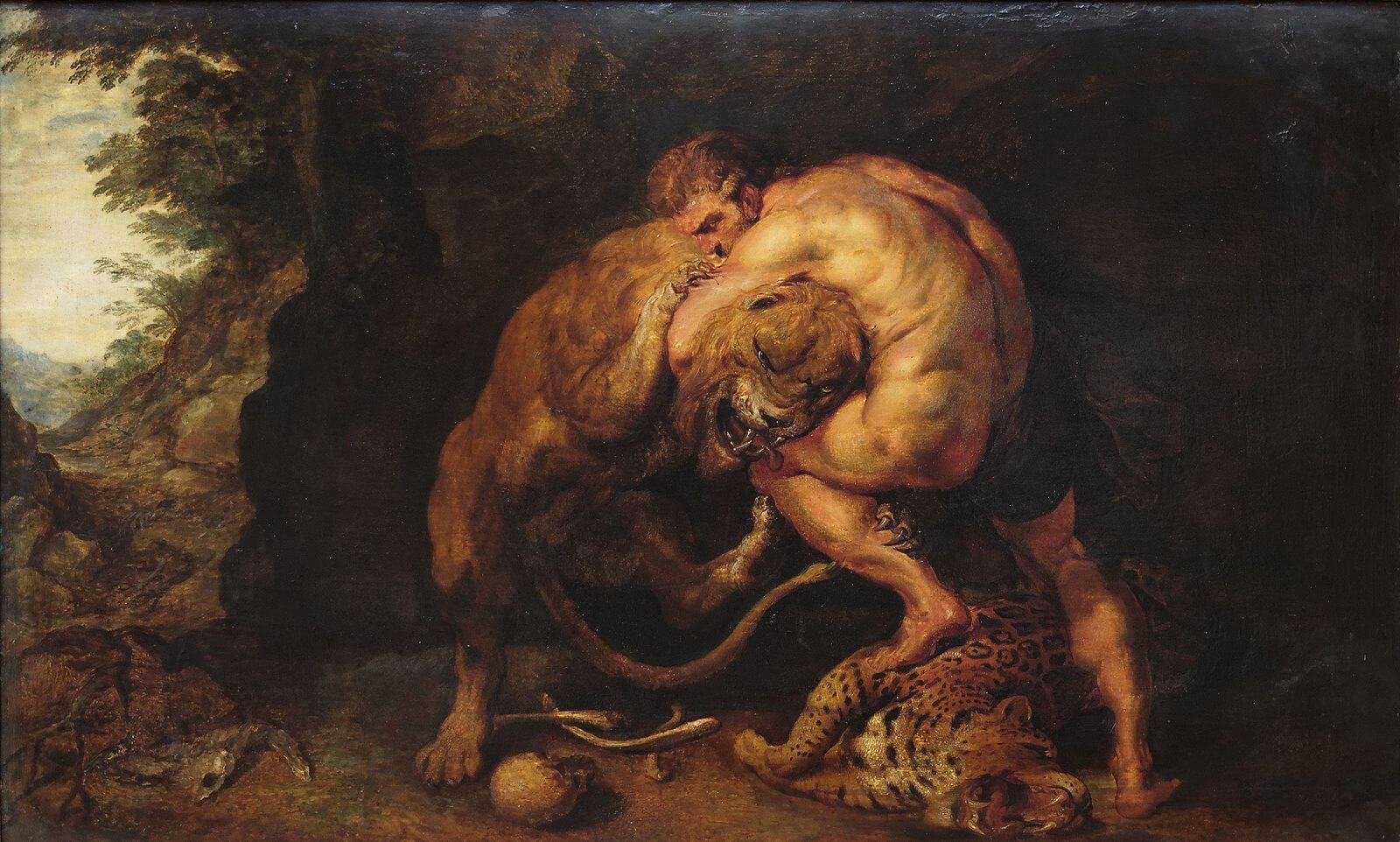
Heracles did not have to wait long for Eurystheus’ first order. The king ordered him to kill a huge lion that lived near the city of Nemea and devastated its surroundings. Terrible was this big feline, the offspring of Typhon and the serpent Echidna. He had an unpenetrable hide, thus it was impossible to pierce him with any kind of weapon, bow or arrows.
Thereupon, Heracles went to the lion’s den and found out that it had two exits. He filled up one of them with stones, and began to wait for the lion, nearby the other one. In the evening, the predator returned from a bloody hunt and Heracles struck him with his club. The sturdy club shattered into wide splinters, but the lion was stunned for a moment and the hero rushed at him, knocking him to the ground and strangling his neck with his powerful hands. The lion growled furiously, trying to shake off the hero, but could not prevail over such a terrible strength. Therefore, Heracles had suffocated him and took off his skin, using it as a piece of armor. He never left it and slept, laying the skin under himself.
Lernaean Hydra
Soon Heracles received a new task. He had to kill the Lernaean hydra – a monster with the body of a snake and nine dragon heads, which lived in a swamp near the town of Lerna. This monster was extremely dangerous and Hera created it with the special purpose to kill Heracles. Therefore, one of its nine heads was immortal, and two new ones would grow back in the place of each head, that would be slashed. The hero saw this feat as a dangerous, thus he took Iolaus (the son of Iphicles) as an assistant for the fight.
Thereupon, the heroes found the swamp where the hydra lived. Heracles teased her, and the monster crawled out of the cave. With a furious hiss, it rushed at the hero, wrapping its tail around his legs and trying to knock him down, but Heracles stood like a rock. His club whistled in the air like a whirlwind and the heads of hydra fell one after another. However, the new fearsome heads grew up shortly afterwards and the monster became more and more powerful! The son of Zeus became exhausted and anguished in the struggle. Besides, a huge cancer crawled out of the swamp and dug its claws into his heel.
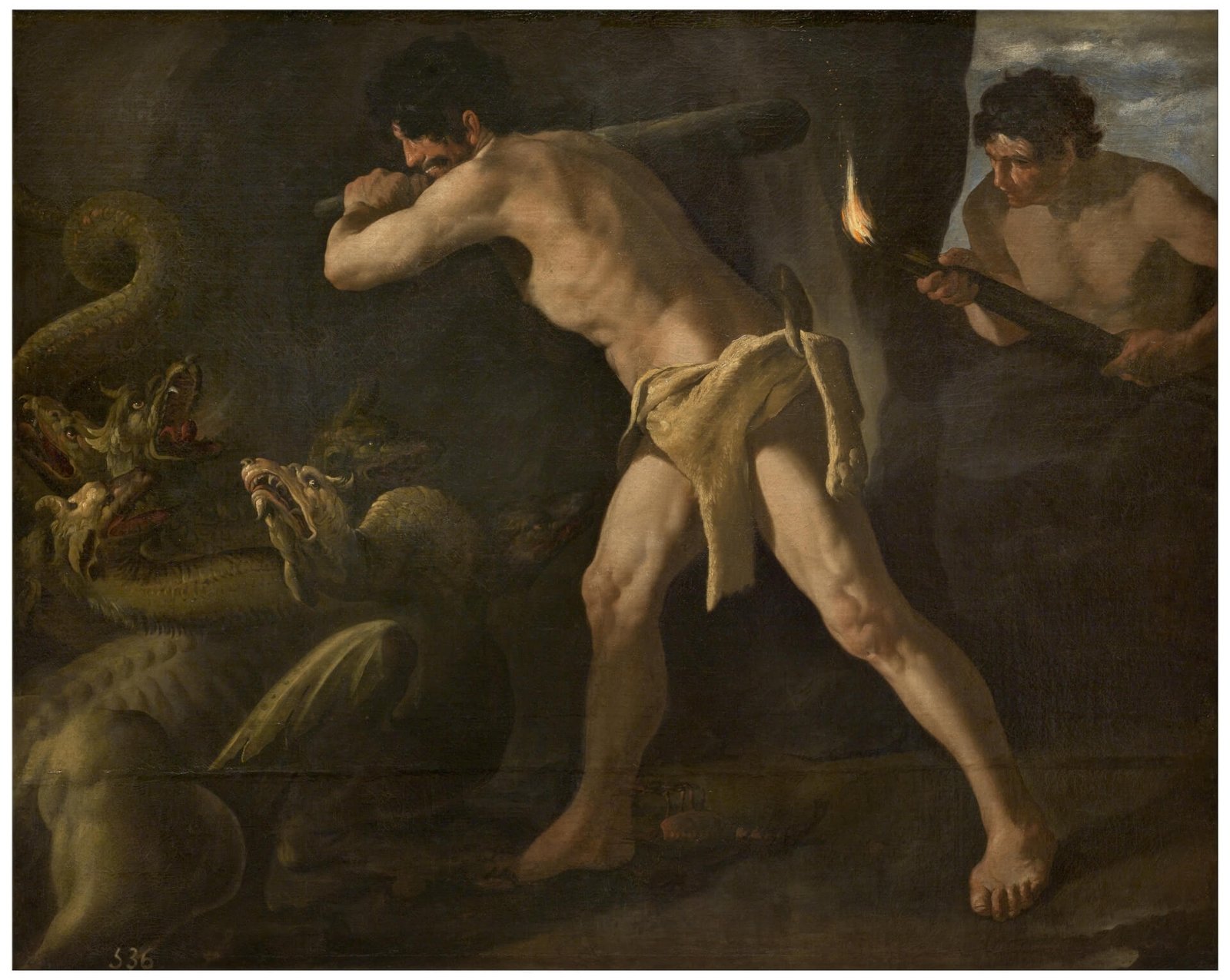
For that reason, Heracles called Iolaus to be assisted. The young hero didn’t hesitate and began to cauterize the slashed necks of Hydra with burning tree trunks. New heads stopped growing, and the immortal one had also fell down, being cut off by the golden sword of Athena. Heracles buried the immortal head of hydra deep into the ground, and chopped up her body into small pieces. He soaked the tips of his arrows in the blood of the creature, and it made them be fatally poisonous.
Thereupon, when Eurystheus discovered that Iolaus helped Heracles, he refused to recognize this feat for the ten assigned by the oracle. Inasmuch as the hero needed to perform the feats unaided.
Ceryneian Hind
Hera realized that as long as the gods help Heracles, she is powerless against him. She decided to make him quarrel with the Olympians. Thus, she ordered Eurystheus to catch the golden-horned Ceryneian Hind, which was sacred for Artemis.
After having received his new feat, from Eurystheus, Heracles decided to capture the doe alive. As a consequence, he pursued it for more than a year from Oenoe to Hyperborea. He did not lag behind: he was not only strong, but also fleet-footed. For a whole year he chased the deer through the forests and mountains, not giving it a rest. Finally, no longer believing that he would catch her, Heracles managed to capture the hind shooting an arrow from his bow. The arrow pinned the front legs of the doe, but it passed between the bone and the tendon. Thus, not a single drop of blood fell to the ground!
On his way back, the hero encountered Artemis and had to ask for forgiveness, explaining his arduous task. The goddess forgave the hero and let him go, but demanded the deer to be freed. Since Eurystheus planned to hold the doe in captivity, Heracles found a way to deceive him. He demanded the king to take the deer from his hands, freeing it in the last moment. Therefore, it had escaped from Eurystheus with its unnatural speed. The servant of Hera felt distressed, but had no other option, as to consider the feat fulfilled.
Erymanthian Boar
Eurystheus wondered himself about the next mission and sent Heracles to the slopes of Mount Erymanthus, there lived the largest and fiercest boar in all Ancient Greece.
On his way to the mount, the hero stopped to visit his old friend, the centaur Pholus. All the centaurs, half-men, half-horses, were wild and ferocious. Only two of them, Pholus and Chiron, had enough wisdom and kindness. Pholus was very happy to see Heracles again, so he opened a jar of a wonderful wine, he had kept for the most honorable guests.
When he uncorked the vessel, the smell of divine drink had spread far away. It attracted all other centaurs, who flocked wildly into the cave and caused a wild riot all over the place. Completely intoxicated and angry the centaurs attacked Pholus and his guest, trying to kill them. Thereupon, Heracles grabbed his bow and began to shoot at the assailants with arrows. Many of them died, but the survivors fled in fear asking Chiron for help. The wise Centaur went out to meet the son of Zeus, with whom they had friendship. However, the hero was confused by the fight, and did not have time to stop his hand. An arrow whistled through the air and pierced Chiron in the leg.
Great sorrow gripped Heracles: he knew that there was no healing from the poison of Lernaean hydra. Chiron knew that, too. But he could not die, since immortality was granted to him by the gods, thus he had to suffer on earth for a long time…
In deep sorrow, Heracles had left Chiron to his fate and went to complete the feat. He found the boar at the foot of Mount Erymanthus. He drove him straight into the deep snow on the top of the mountain. Afterwards he tied him up and brought him alive to Mycenae. When Eurystheus saw the kind of prey, which Heracles had captured, he was seized by the most awful fear. He began to rush around the palace searching for shelter and finally took refuge in a large bronze jar.
Heracles and the Augean Stables
Inasmuch as Heracles performed all the tasks perfectly, Eurystheus became furious and decided to humiliate him. This time the wicked king had searched for something filthy and impossible. He ordered the hero to clean the stables of the king Augeas.
The son of Zeus went to see Augeas immediately. The herds of this king were countless, but for thirty years, no one cleaned his stables and barnyard. Mountains of manure laid there, and its stench spread throughout the area. Heracles spoke with the king, promising to clean the stables in one day. As a matter of fact, he demanded a tenth of Augean flocks as a reward for the mission. Augeas agreed, but never thought to keep his promise. He believed that it was impossible to accomplish such a task in one day.
However, Heracles managed to clean the stables. He dismantled the walls of the cattle yards and redirected the rivers Peneus and Alpheus to wash away all the manure. Thereafter the water gushed into the gaps and took away all the dung. In the evening, when everything was cleaned, Heracles put the walls back and went to Augeas for reward. However, the king didn’t want to keep the agreement. He tried to drive away the hero, as if he was an errand boy. It made Heracles very angry, so he had killed Augeas, giving his kingdom to his son Phyleus.
Later, when the hero returned to Eurystheus, he didn’t count this feat for the ten labors. Insomuch as the rivers did all the work instead of Heracles and he intended to be paid for the mission. Once again, Hera and her pathetic servant had laughed over the strongest man in the world.
Stymphalian birds
Heracles did not have time to take a proper rest after his last mission, when Eurystheus sent him away once again. This time the task was difficult. The son of Zeus had to slay the giant man-eating birds. They had beaks of bronze and sharp metallic feathers, which they used to launch at their victims. Like arrows, the feathers stuck into anyone, who would try to attack the birds.
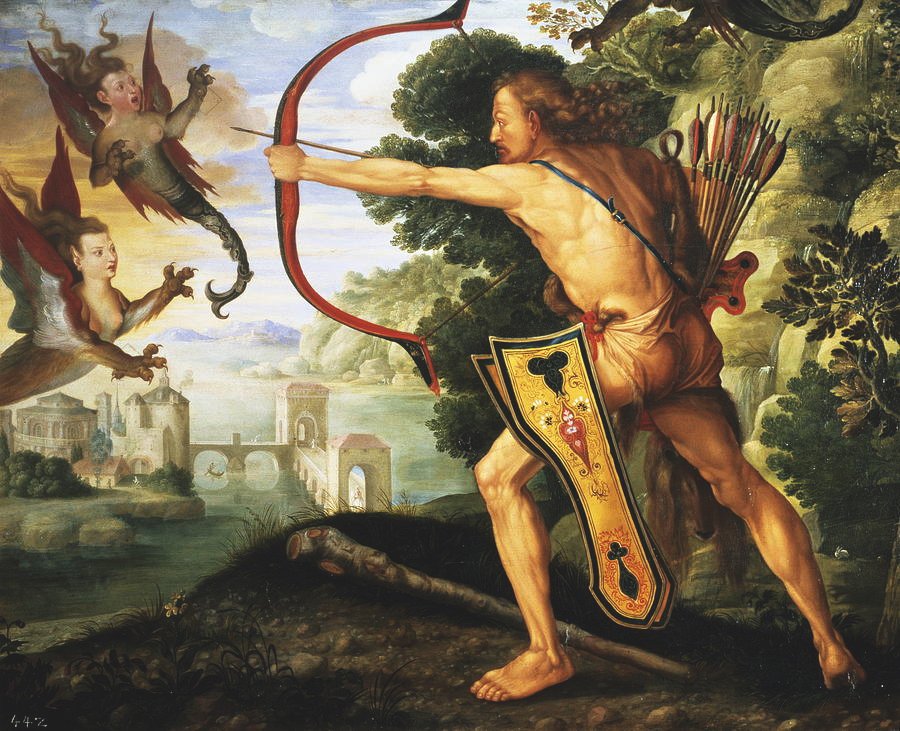
Athena, the goddess of wisdom came to aid Heracles in his labor. She gave him a rattle made by Hephaestus. The sound made by the vessel was so strong, that no living creature could bear it. Thus, the birds became frightened by the terrible sound, and fled away in anguish. Meanwhile Heracles had shot many of them with his bow and arrows and picked up their corpses as a proof.
Cretan Bull
Eurystheus decided to send Heracles away from Greece, hoping that somewhere in a foreign land he would find his doom. Therefore, he ordered him to sail to the island of Crete, to catch the snow-white bull. Poseidon sent it to the Cretan king as a sign of his royal power, but it became the local terror of the islanders. Thereupon, Heracles triumphed again and caught the bull, returning unharmed and having fulfilled the mission.
Mares of Diomedes
Very angry, Eurystheus had planned something worse for Heracles. He sent him straight to the Thracian king Diomedes, who had horses of wondrous beauty and strength. They stood chained in the stalls with thick iron chains, insofar as no fetters could hold them. Diomedes fed them with human meat. He threw all the foreigners and strangers who arrived at his island into the stables to be eaten. That being so, Heracles coped with this difficult task as well. He deceived the cruel king and let the mares to devour him. A time after, he took possession of the wild horses. He bounded them together and slew the guards of Diomedes.
Heracles and the king Admetus
An incident had occurred to Heracles on his way to Diomedes. Along the way, he decided to visit his friend, king Admetus. However, he came to his house at the wrong time, when a great grief had reigned over the place.
The Fates foretold a soon death to Admetus and he lived saddened. Nonetheless Apollo managed to find a truce. The young king would not perish, if he could find someone, who would die in his place, descending into the gloomy kingdom of Hades instead of him. The hour of death had come, but no one agreed to make such a sacrifice. Neither parents of the king nor his close friends. Only his beautiful young wife Alcestis volunteered to replace her husband. She put on a clean beautiful dress, and laid down on a bed, waiting for death. Shortly afterwards a black shadow had fallen upon her, taking away her vivid beauty and life.
When Heracles arrived at the palace of Admetus, no one wanted to sadden him, and the owner of the house hid his grief as well. However, the hero began to notice that many servants were crying and nobody was having fun. He called one of the servants aside and started asking questions. A short time after he discovered the tragic secret and decided to thank Admetus.
Heracles and Thanatos
Heracles asked where the grave of Alcestis is, and went down for a visit. He knew that the sinister Thanatos, the god of death, was coming to the graves to drink sacrificial blood. The hero hid and waited. When finally, he heard the flapping of Thanatos’s black wings, the deathly cold had spread around the place. But Heracles did not succumb to fear, he jumped out of the ambush and rushed at the terrible god. A struggle began between them. The hero wrapped his mighty arms around Thanatos and exerted all his strength in the struggle. Shortly afterwards, he had defeated Thanatos, given that he could not resist such a pressure over his body. He agreed to bring Alcetis back to life and resuscitated the youthful maiden.
Thereafter Admetus and his spouse had reunited and rejoiced at their freedom together. They wanted Heracles to stay for a long merry rest. But he didn’t want to disturb their rapture and set off on a further journey.
The Ninth Labour: The girdle of Hippolyta
After the mares of Diomedes, Eurystheus had to recognize six feats to Heracles. He felt upset and angry in his sadness, eager to find a feat that would make the hero disappear forever. For that reason, Euryspheus planned an especially perilous task. He demanded the son of Zeus to go and retrieve the belt of Hippolyta for his daughter. Nonetheless it had belonged not just to a simple woman, but to the queen of Amazons, who dwelled nearby the outermost limits of the known world. Ares himself gave her this war girdle, because she was his daughter. Thus, it had a special magic, which endowed its bearer with superhuman strength.
Heracles gathered a small detachment of warriors and went on a long journey. He experienced many adventures on his way, but finally reached the city of the Amazons.
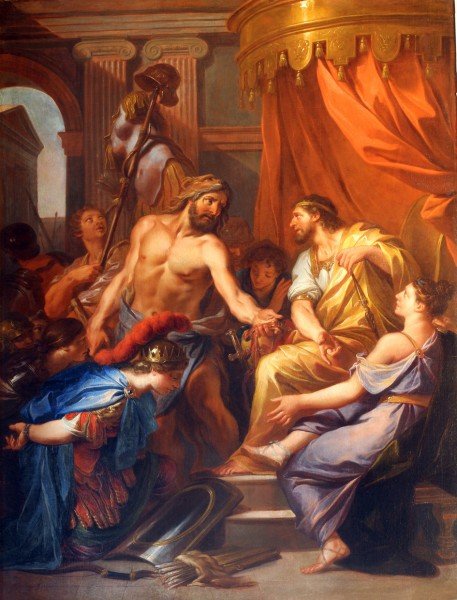
Upon his arrival, Hippolyta did not want to fight with the hero. In contrast, she was ready to voluntarily give him the belt to Heracles, but Hera had appeared disguised as an amazon between the crowd and caused an outrage, crying out, that Heracles pretended to kidnap the queen. The Amazons believed the insidious words of Hera, took up their arms and attacked the Greeks. Shortly afterwards they had received a fierce rebuff from the heroes, staining the earth with their blood. In the middle of the turmoil Heracles had to fight and kill Hippolyta. He felt engraved and saddened but took her belt as a promised reward.
The cattle of Geryon
Once again Eurystheus had found a very dangerous task for Heracles. He sent him to the further west of Hellas, to steal the herd of the giant Geryon. The giant had three heads and three bodies with six mighty arms on his sides. Another giant, named Eurytion and the two-headed dog Orthrus had been guarding his herd of bulls.
Thereupon Heracles had crossed the Libyan desert on his way to the island. He became anguished and angry due to the unbearable heat, which scorched his body along this endless journey. Full of wrath, Heracles saw Helios overflying the desert, so he grabbed the bow and shot an arrow at him. Helios wasn’t angry, after such an attempt, otherwise he liked the fearlessness of the hero. Hence he gave him the golden cup, he was using to sail across the sea.
The golden bowl of Helios was flying quickly over the ocean waves, so just shortly afterwards Heracles reached the shore of the island where Geryon lived. The dog Orthrus rushed at the hero, barking menacingly, but fell down, struck by his club. The same fate befell the keeper of the herd, Eurytion.
Afterwards, the son of Zeus gathered the bulls and drove them to the golden bowl. By the time he loaded up the herd into it, Geryon himself appeared on the seashore and hurled three deadly spears at once. However, Athena deflected each one of them from the hero. A time after, Heracles managed to slay the giant, piercing his forehead with an arrow, dipped in the blood of the Lernaean hydra. Geryon fell down like an awkward puppet and died in agony.
Once in Mycenae, Eurystheus received the herd with a cowardly smile and had immediately sacrificed the bulls to Hera.
Heracles’ Eleventh Labour : The Apples of the Hesperides
After many years of journeys and missions Heracles’s service was coming to an end. Eurystheus became older and weaker, and was not willing to retain him anymore. Therefore, for the penultimate feat he followed the indications of Hera and asked the hero to steal the apples from the garden of the Hesperides.
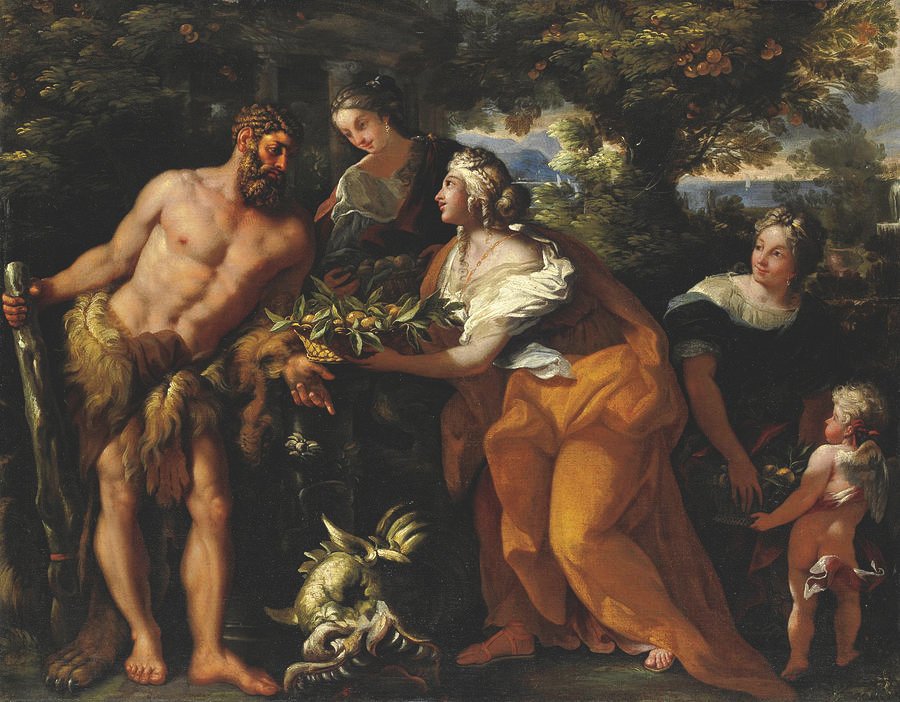
On his way to the garden, Heracles wandered around Greece for a long time. No one could tell him about the whereabouts of the wonderful golden apples. For that reason, he waylaid the sea elder Nereus, who knew everything in the world and entered into a struggle with him.
The old man took different guises in order to free himself, but the mighty hero squeezed him tighter and tighter. Finally, Nereus gave up and showed the son of Zeus the way to the end of the world.
Heracles and Atlas
A time afterwards Heracles reached the limits of the world. He saw the mighty titan Atlas, huge as a mountain, holding the sky on his shoulders. Atlas had also sighted the hero. He asked him about his provenance and the purpose of visit in such a distant, lonesome place. Heracles had mentioned, that he needed to retrieve three golden apples from the gardens of the Hesperides, and Atlas had agreed to help him. However, the hero had to sustain the sky in his place, meanwhile he was gone to speak with his daughters Hesperides in order to obtain the golden fruits.
Thereupon, the mighty hero, took the sky instead of the titan. An incredible weight descended upon his shoulders. His muscles swelled like mountains, under such a heavy burden, but he persevered. Heracles lost track of time, and didn’t know how many hours or days he stood, holding the firmament. However, Atlas had returned with the apples.
The titan felt free at once and tried to deceive Heracles. He told that he wanted to rest and suggested to carry the apples by himself, wherever they needed to be delivered. The mighty hero responded positively, but asked the giant to hold the sky for a moment, so he could put the lion’s skin on his shoulders, to avoid the terrible burden of the firmament.
The satisfied Atlas left the golden apples on the ground and took his place again. Meanwhile Heracles stepped aside and said, that holding the sky was not his mission. He picked up the apples from the ground and went back to Mycenae to Eurystheus.
The craven king was so upset when he learned about the return of the hero, that he did not want to see him, or accept the golden apples. That being so, Heracles gave them to Athena, and she returned the apples to the Hesperides. Thereafter, they shined forever in the garden, as its most important and magical treasure.
Heracles’ twelfth labour: Cerberus
For the last feat Eurystheus decided to send Heracles into the dangerous Underworld to bring the three-headed Cerberus.
The hero felt saddened when he heard such an order. No one had yet managed to penetrate the gloomy world of the dead and return alive. But, believing that the immortal gods would not abandon him to his fate, Heracles set off on his way.
In the very south of Hellas, there yawned a terrible abyss. At its bottom lied the road to the underworld; no one never dared to follow this path or speak about it. Even so, Heracles did not hesitate. He approached the gloomy cleft and began to descend into the terrible abyss. In the middle of the way, he met the god Hermes with his magical wand. He offered to guide him towards the kingdom of shadows, and reach the palace of Hades together.
Thereafter Heracles saw many things on his way. Between the creatures and the spirits of the underworld he met the shadow of his friend, the hero Meleager. He asked him to marry his sister Deianira, after having returned safe to the surface. The hero was not willing to upset his old friend and promised him to do so. On his further way Heracles saw the shadow of the fearsome gorgon Medusa and was about to grab his sword, but Hermes had stopped him. He said that it was just a disembodied shadow of the monster, which had slain his great-grandfather Perseus.
Heracles in the palace of Hades
Once inside the main palace of the underworld, Heracles presented himself before the powerful Hades and explained his urge to catch Cerberus. His tone was not imperious, but humble and respectful. Thus, the lord of the dead allowed him to take the dreadful hound to Eurystheus. However, the hero needed to defeat him barehanded and without the use of any weapons.
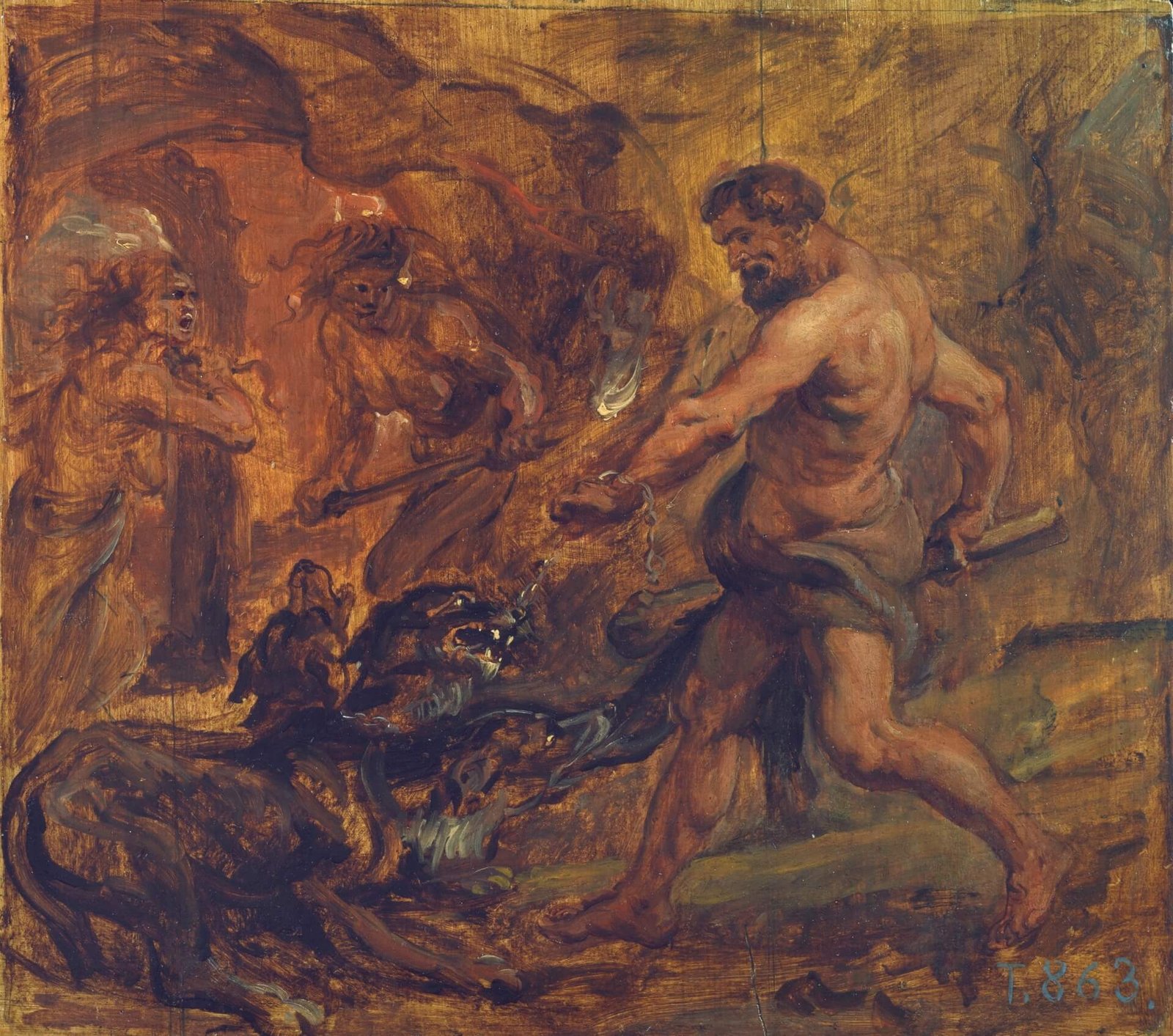
Thereafter Heracles found Cerberus on the shores of the river Acheron and grabbed him with his mighty hands. The three-headed hound howled so much, that his cry echoed throughout all the underworld. He tried to escape from the arms of the hero, but was not even able to move. Cerberus felt suffocated by his strong muscles and in the end resigned himself. Heracles took him to the surface and made his way to Mycenae. By the time when Cerberus saw the daylight he became completely quiet and was covered with cold sweat. Poisonous saliva dripped from his three mouths, and toxic herbs grew everywhere where it fell to the ground.
Once in Mycenae Eurystheus felt horrified when he saw Cerberus. He fell to his knees and begged Heracles to release the hellhound as soon as possible. The hero fulfilled his request, and the dreadful hound rushed off to Hades faster than the wind. After a long time of torturous adventures and wanderings Heracles had gained his long-awaited freedom. Once and forever.
Heracles and Deianira
Heracles performed many more feats, while serving Eurystheus. He freed Prometheus, chained in the Caucasus, and took part in the Argonauts’ campaign for the Golden Fleece. Furthermore, he did not forget the promise, made to Meleager in the underworld. He went to see her father – the Calydonian King Oeneus, and asked for Deianira’s hand in marriage.
However, he met a formidable rival that wooed the princess for a long time. The river god Achelous also sought her consent and wanted to marry the young maiden. That being so, the king Oeneus decided to solve the dispute with a fight. The one who would come out victorious in the duel, would get his daughter. Thereupon, Heracles and Achelous had fought for a long time. However, the hero managed to defeat the god and Oeneus gave his daughter to him.
Deianira and the centaur Ness
Heracles went home with his young wife. On their way back they encountered the wide river Euenos, that blocked their path. A centaur named Nessus transported travelers through it for a fee. Deianira sat on his back, and Heracles started swimming. Suddenly he heard the loud screams of his wife calling for help, and saw that the centaur, captivated by her beauty, tried to kidnap her.
Thereupon the hero quickly climbed ashore, pulled his bow and shot a deadly arrow. The mortally wounded Nessus fell to his knees in agony, meanwhile a puddle of blood with the poison of the Lernaean hydra had extended all around him. But he didn’t want to die unavenged. Gathering his last strength, Nessus turned to Deianira and lied to her in a very vile way: “Oh, the beautiful daughter of Oeneus! I am guilty before you, but I want to atone for my guilt. Take my blood and keep it safe! If Heracles ever stops loving you, rub his clothes with my blood, and you’ll again become his only beloved!”
Deianira had done everything as the dying centaur told her. She collected his blood in a small vessel and hid it without telling anything to her husband.
Heracles and King Eurytus
Years have passed. Heracles and Deianira lived happily, having a lot of children together. But one day the legendary hero went on a campaign against the king Eurytus. A long time ago, before marrying Deianira, the son of Zeus wanted to marry Eurytus’ daughter, named Iole. Therefore, he had won the children of Eurytus and the monarch himself in the contest of archery, specially organized to select the groom. However, Eurytus deceived Heracles and did not allow him to marry his daughter.
The king feared Heracles to go mad and kill his daughter, in the same way as it happened with his first wife and children. However, the hero became angry and swore revenge. Although of being married with Deianira, he conquered the city where Eurytus ruled. Afterwards he killed him and his sons, forcing Iole to be his lover and breaking his promise of fidelity.
The jealous plan of Deianira
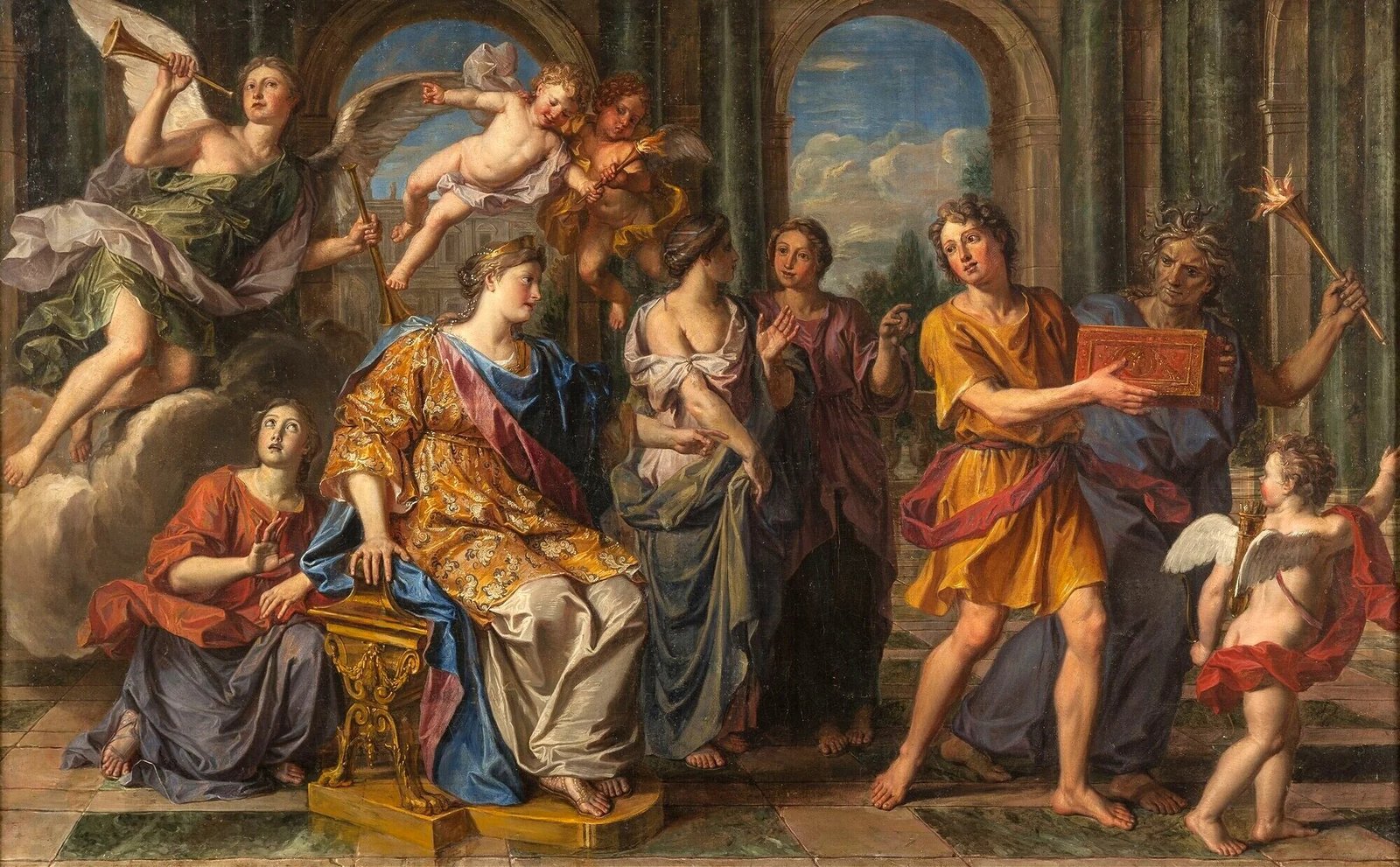
When Deianira saw Iole, a dark jealousy crept into her heart. Bad thoughts did not allow the princess to have a rest. So she decided to use the gift of Nessus and make her husband fall in love with her. She took out the vessel with the blood of centaur and mixed it with an olive oil. Afterwards, she poured some of the liquid over Heracles’ lionskin cloak. Later, she called Lichas, the servant of their family and sent him to the great hero with the armour.
Very soon Deianira realized that her messenger was bringing death to Heracles. Since she saw that the woolen cloth, she used to rub the cloak had turned into ashes, covered by a bloody venomous foam. However, there was nothing else she could do.
The suffering of Heracles and the death of Deianira
Heracles received the package from his wife with great delight, and put on the lionskin cloak without suspecting anything. For sudden he felt unbearable pain, being burnt by the poison of the Lernaean hydra, and began to tear off his cursed clothes. However, the cloak stuck to his body even more, so he tore it off with the pieces of his own skin.
Thereupon the servants brought Heracles back home on a stretcher. Completely destroyed and agonizing, he learned the whole truth about the gift. He seemed to suffer so much, that Deianira couldn’t bear what she had done. As a result she pierced her heart with a sharp sword and died.
The death of Heracles
Heracles commanded his son to carry him to the Mount Oeta. There, at the top, he built a huge funeral pyre and laid on it. The sufferings of the hero became more intense and insupportable. So he preferred death in flames, then such a kind of torments! For that reason, Philoctetes, his close friend, came to the mountain, and lighted the funeral pyre.
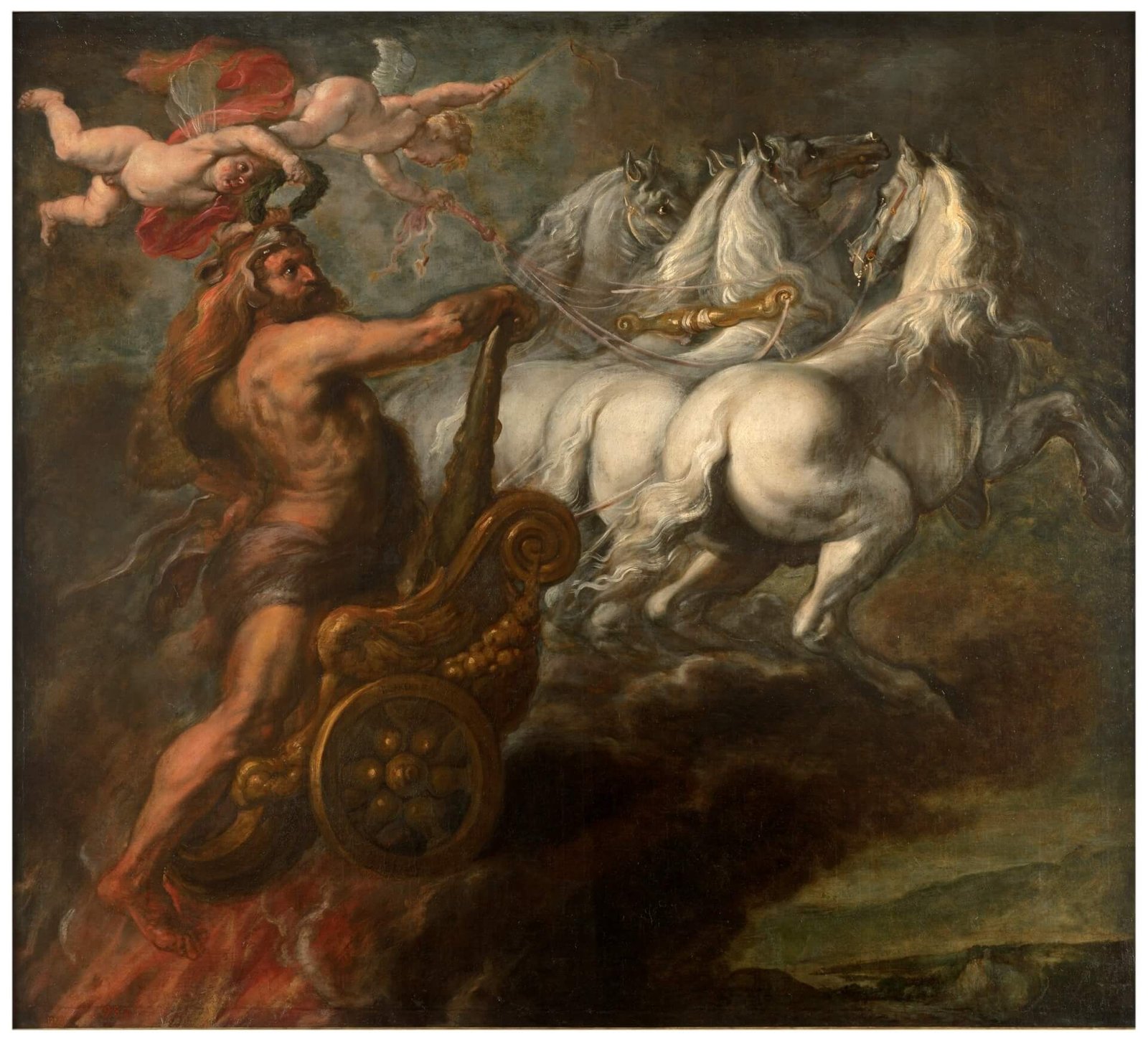
The flames of the bonfire flared up brightly, but the lightning of the great Zeus had shone even stronger. Athena and Hermes approached to the bonfire on a golden chariot, picked up the greatest of the heroes and carried him to Olympus.
Thereafter the gods met the hero with rapture and cheer. Hera forgot her former hatred to Heracles and gave him her daughter Hebe in marriage. Since then, the legendary hero had been living on Olympus with the immortal gods. This is how Zeus rewarded him for his earthly exploits and sufferings.
